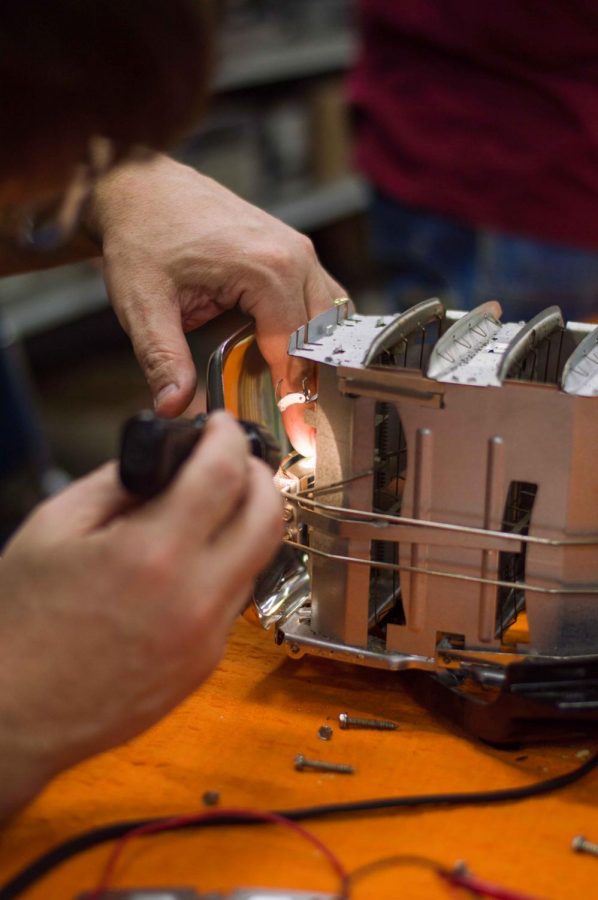Oregon State University students promote ‘DIY’
February 26, 2016
OSU club fights waste through repair, pushes fixing of broken items
The line wound around the building as people anxiously awaited their diagnosis. Yet, this was not a doctor’s appointment.
Oregon State University students, faculty and Corvallis residents all gathered at the OSUsed store for the winter term Repair Fair on Wednesday night.
The Repair Fair is a continuous event sponsored by the student group Waste Watchers in collaboration with the Student Sustainability Initiative, where anyone can bring in broken items and have them fixed for free and learn how to fix items themselves.
Kyle Reed, the student outreach assistant for campus recycling, and the coordinator of the Repair Fair, explained how the event focused on promoting waste reduction and sustainability.
“We are trying to cultivate a more DIY community,” Reed said. “We live in a very wasteful society and we are trying to encourage more people to take a look at their things instead of just buying something new. Often times their item can be fixed with a certain part or a simple solution.”
The event recruited volunteers from around OSU and Corvallis to offer a broad range of services. These services included help with; appliances, bicycles, clothing, computer diagnostics, electronics, houseware items, musical instruments and more. The event also offered drop-in demonstrations to learn about specific skills such as growing a garden.
“We bring together volunteers from all around Corvallis including students, professors and what we like to call ‘DIY enthusiasts’ or ‘professional tinkers’ from within the community,” Reed said. “These volunteers put their heads together to pass around ideas in order to figure out what is wrong with different items.”
The Corvallis Bike Collective is one of the several groups that helped with the repairs. The can be fixed with ease.
collective helped bike owners locate common problems with their bikes and fix them on the spot. According to Kyle Grant, a collective volunteer, most squeaking, rubbing and misaligned bikes
“Sometimes it is as simple as just turning a screw,” Grant said. “Our mission here is to get more people to know about their bikes and help them learn to fix them on their own.”
Chris Moser, a returning houseware repair volunteer and self-taught handyman, worked with several customers and their items at the event. Moser worked diligently to locate why items were not working, and offered solutions and other resources if they were not available to him in the warehouse. Moser stood by the waste reduction theme by sporting a ‘Broken is never the end’ t-shirt that advocated for sustainability.
“I have an obligation to repair things rather than throw them away,” Moser said. “It should always be reuse, repair and then recycle.”
One of the estimated 50 customers that attended the Repair Fair, Barb Danko, a returning customer, was one of the many people that Moser assisted. Danko brought in her lamp that no longer lit-up, and patiently waited for Moser to take it apart and assess it. Although Moser did not have the necessary part to fix the lamp, he explained where to get the missing part and taught Danko how to fix it at home.
“I’m a huge supporter of this event and of recycling in general,” Danko said.
John Tietjen, an electrician of 35 years, assisted with the broken appliances table at the event. Tietjen puzzled over a broken heater for several minutes before he plugged it into a digital volt meter to find the problem. After determining that the heater still functioned, Tietjen still opted to take the space heater home to make sure it was fixed before returning it to the owner.
“If you have the right tools, the knowledge of how to use them and the initiative to do it yourself, more than half of the broken things you own are fixable,” Tietjen said.
For those interested in volunteering with future Repair Fairs, the Waste Watchers meet on Mondays from 6:00 p.m. to 7:30 p.m. in the Student Experience Center 206.











































































































